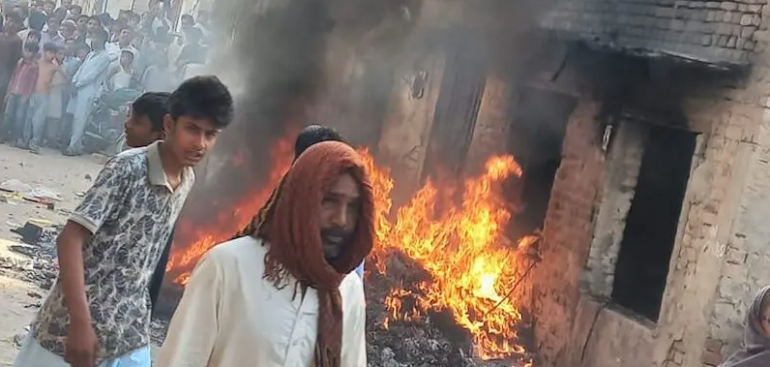Nearly two years after the horrifying night of August 16, 2023—when the skies over Jaranwala turned orange with the flames of hate—a court in Pakistan has delivered a verdict that many fear will haunt the Christian community for generations.
On that day, over 20 churches were set ablaze, and more than 80 Christian homes were reduced to ashes. The mobs chanted, cheered, and torched sanctuaries of prayer and peace. Crosses were torn down. Bibles turned to soot. Families fled with whatever they could carry—often just fear.
And now, ten men accused of orchestrating this carnage, including the primary suspect Ausaf Ali and his two sons, have walked free. Their acquittal by Judge Javed Iqbal Sheikh of the Anti-Terrorism Court in Faisalabad was not based on innocence but “lack of evidence.”
But survivors of Jaranwala remember.
They remember the faces. The fire. The chants. The helplessness. One victim identified all ten men in a jail identification parade. That testimony now lies ignored—discarded like the charred remains of their homes.
The Church Management Committee of Jaranwala has called out what many are calling a sham trial. They allege that police deliberately sabotaged the case, manipulating evidence, shielding perpetrators, and failing to present crucial facts before the court. Their lawyer, Akmal Bhatti, did not mince words: “Police investigators failed to conduct a transparent probe. They intentionally ignored solid evidence against the suspects.”
The same justice system, however, had no such hesitation in sentencing a Christian man, Pervez Masih, to death earlier this year for allegedly committing blasphemy—a charge he later admitted was fabricated to frame two other Christian brothers out of personal rivalry. The brothers, Amer and Umair Masih, spent weeks in custody before their innocence was proven.
There is a disturbing pattern here.
According to Amnesty International, 5,213 suspects were identified in the Jaranwala violence. Only 380 were arrested. 4,833 roam free. Among those arrested, 228 have already been released. This isn’t a legal process—it’s a tragedy being replayed in slow motion.
And while the perpetrators walk free, 40% of Christian families affected by the riots are still waiting—for justice, for compensation, for even the basic recognition that what happened to them mattered.
Jaranwala is not just a name. It is a wound. And today, that wound has been reopened—not by fire this time, but by silence, apathy, and a justice system that has once again failed its most vulnerable.
If this is justice, then what is impunity?
